- Home
- Kate DiCamillo
Raymie Nightingale Page 6
Raymie Nightingale Read online
Page 6
“Oh, my goodness,” said Louisiana. “Here we go.”
And they went.
Louisiana’s grandmother did not believe in stop signs, or she did not see them, or maybe she did not think that they applied to her. Whatever the reason, the Elefante station wagon went past every stop sign without stopping or even slowing down very much.
They were going very, very fast, and the car emitted a lot of noises: screeches (from the piece of loose wood siding), thumps (from the door that would not stay closed), and a cacophony of mechanical grinding noises — the overworked and desperate sounds an engine makes when it has been pushed beyond its limits.
Also, from the backseat it was not possible to see Louisiana’s grandmother’s head, and so it seemed as if they were being driven around by an invisible person.
It all felt like a dream.
“Don’t worry,” said Louisiana. “Granny is the best there is. She has outwitted Marsha Jean every single time.”
Beverly snorted.
At this point, the station wagon went faster — though a moment ago, Raymie would have said that this was not possible.
Raymie looked over at Beverly and raised her eyebrows.
“We’re getting the heck out of Dodge,” said Beverly. She grinned, displaying a chipped front tooth. Raymie wasn’t sure, but she thought that it might be the first time she had seen Beverly Tapinski really, truly smile.
Louisiana laughed. “We are!” she said. “We are leaving Dodge far behind.”
From the front seat, the invisible granny laughed.
And then Raymie was laughing, too.
Something was happening to her. Her soul was getting bigger and bigger and bigger. She could feel it lifting her off the seat, almost.
“The trick with people like Marsha Jean,” said Louisiana’s grandmother, “is to be forever wily, to fight back, to never give up or give in.”
The car went a little faster still.
Raymie understood that, technically, she should be afraid. She was in a car that was being driven too fast by a person who was invisible. Plus, the car sounded like it might fall apart at any minute.
But Louisiana was on one side of her — with her bunny barrettes and her sequins and the Florence Nightingale book in her arms; and Beverly was on the other side of her — bruised, grubby-handed, and smelling like some strange combination of motor oil and cotton candy. And there was a gigantic wind blowing into the car, and Raymie’s soul was as big as it had ever been before and she felt not one bit afraid.
She turned to Beverly and said, “You held Alice Nebbley’s hand.”
“So what?” said Beverly. She shrugged. She grinned again. “She asked me to.”
“I am so happy,” said Louisiana. “All of a sudden, I’m just filled up with happiness. Should I sing, Granny?”
“Of course you should sing, darling,” said her grandmother.
And so Louisiana started singing “Raindrops Keep Fallin’ on My Head” in the prettiest voice Raymie had ever heard. It sounded like an angel singing. Not that Raymie had ever heard an angel sing. But still, that was the way it sounded. Raymie listened and looked out the window at the stop signs rushing by.
For some reason, even though the song wasn’t a sad song, it made Raymie think of sad things. It made her think of the kitchen light in her house, the one over the stove, the one that her mother left on all night long.
It made her think of how, one time, she had come out to the kitchen in the middle of the night for a drink of water and had seen her father sitting at the table with his head in his hands. He had not seen her. And Raymie had backed up slowly and gone back to bed without saying anything to him.
What was he doing at the table, alone, with his head in his hands?
She should have said something to him.
But she had not.
Louisiana finished singing, and her grandmother said, “It does my heart good to hear you sing, Louisiana. It makes me believe that all will be well.”
“All will be well, Granny,” said Louisiana. “I promise you. I’m going to win that contest, and we will be rich as Croesus.”
“You are the best granddaughter an old woman could hope for. And now will you just look where we are?”
“Home!” said Louisiana.
“Yes,” said her grandmother.
The car slowed down and turned off the paved road and onto a dirt road.
“We can all have some tuna fish together!” said Louisiana.
“Oh, boy,” said Beverly.
And then they were at the end of the dirt road, and a gigantic house was in front of them. The front porch was sagging and the chimney was tilted to one side, as if it were considering something important. Some of the windows were boarded up.
“Come on,” said Louisiana. “We’re here.”
“Really?” said Beverly.
“Yes,” said Louisiana’s grandmother. “We’ve outsmarted Marsha Jean, and we’re home.”
In the kitchen, there were several towering piles of empty tuna-fish cans. The walls were painted green, and for the first time, Raymie stood face-to-face with the grandmother. It was like looking at Louisiana in a fun-house mirror. The grandmother’s hair was gray and her face was wrinkled, but other than that she looked exactly like her granddaughter. She was tiny, not much taller than Louisiana, and she, too, had bunny barrettes in her hair, which was strange because you did not necessarily think that old people wore barrettes.
“Welcome, welcome,” said the grandmother, spreading her arms wide. “Welcome to our humble abode.”
“Yes,” said Louisiana. “Welcome.”
“Thank you,” said Raymie.
Beverly shook her head. She wandered out of the kitchen and into the living room.
“It’s such a pleasure to make the acquaintance of Louisiana’s best friend,” said the grandmother to Raymie.
“Me?” said Raymie.
“Oh, yes, you. It’s ‘Raymie this’ and ‘Raymie that’ all the livelong day. It must be wonderful to be idolized so. Now. Just let me locate the can opener,” the grandmother said, “and we will have ourselves a tuna-fish feast.”
“Oh, my goodness,” said Louisiana. “I love it when we have tuna-fish feasts.”
“Where’s the furniture?” asked Beverly. She was standing at the threshold to the kitchen.
“I beg your pardon?” said Louisiana’s grandmother.
“I’ve been all over the house and there’s no furniture.”
“Well, why on earth are you going all over the house searching for furniture?”
“I —” said Beverly.
“That’s exactly right,” said the grandmother. “Maybe you could make yourself useful and find the can opener, since you enjoy searching for things so very much.”
“Okay,” said Beverly. “I mean, I guess so.” She stepped into the kitchen and started opening and closing doors.
“Oh,” said the grandmother. She put both hands to her head. “I just now have had a sudden recollection. The can opener is in the car.”
“It’s in the car?” said Beverly.
“Louisiana, run out there and get it for me, would you, darling? And do not return until you find it.”
“Yes, Granny,” said Louisiana.
Louisiana turned and left in a flash of orange and sequins and bunny barrettes. As soon as the screen door slammed shut behind her, the grandmother turned to Beverly and Raymie and pulled a can opener out of the sleeve of her dress.
“Ta-da,” she said. “My father was a magician, the most elegant and deceitful man who ever lived. I learned a few things from him that I’ve found to be of some use — sleights of hand, for instance, how to conceal things.”
She waggled her eyebrows.
“Were Louisiana’s parents really trapeze artists?” asked Raymie. “Were they the Flying Elefantes?”
Beverly snorted.
“The story of the Flying Elefantes is a story worth telling again and again,” said
the grandmother.
“But is it true?” asked Raymie.
Louisiana’s grandmother raised her left eyebrow and then her right one. She smiled.
Beverly rolled her eyes.
“What about Marsha Jean?” asked Raymie. “Is she real?”
“Marsha Jean is the ghost of what’s to come. It’s good to be on the lookout for those who might do you harm. I need Louisiana to be cautious. And wily. I won’t always be here to protect her. She would have a very hard time if she ended up in the county home. I’m hoping that you two can keep an eye on her, that you’ll protect her.”
The screen door slammed.
“I looked everywhere, Granny,” said Louisiana. “I can’t find it.”
“No worries, darling. I’ve located it. And now we’ll feast!” The grandmother held up the can opener. She smiled.
How could Raymie protect Louisiana?
She didn’t even know how to protect herself.
They sat on the floor of the dining room underneath a gigantic chandelier.
“It’s very pretty if we turn it on,” said Louisiana. “But right now, we can’t turn it on because we don’t have electricity.”
The lack of furniture in the room made the words they said to each other sound funny. Everything echoed and bounced.
They ate tuna fish directly out of the can, and they drank water out of little paper cups that had riddles printed in red on their sides.
“They’re supposed to have the answer to the riddle on the bottom, but they made a mistake and forgot to put the answer there,” said Louisiana, “and that’s why we got thousands of the cups for free. Because they don’t have the answer. Isn’t that something?”
“Yeah,” said Beverly. “That’s something.”
Raymie held up her paper cup and read the side of it out loud. “What has three legs, no arms, and reads the paper all day long?”
She looked at the bottom of the cup. There was nothing there.
“See?” said Louisiana. “There’s no answer.”
“It’s a stupid question,” said Beverly.
Outside, there was a flash of lightning and then a large clap of thunder. The chandelier shook.
“Ooooooh,” said the grandmother. “It’s going to be a big one.”
“It’s lucky that we’re safe inside and all together,” said Louisiana.
The rain started to come down in sheets, and the dining room, which was painted a deep blue, became a murky underwater kind of place. Raymie wondered if they had maybe, somehow, journeyed to a different world, the four of them together. It had been such a strange day.
“Granny?” said Louisiana.
“Yes, darling.”
“I miss Archie.”
“Now, don’t get started on that. Remember what I said: There’s no point in looking back.”
“But I miss him,” said Louisiana. Her lower lip trembled.
“They’re taking good care of him at the Very Friendly Animal Center. I’m certain of it.”
Beverly snorted.
Louisiana started to cry.
“Don’t think about it, darling,” said the grandmother. “Some things just do not bear thinking about. Eat your tuna fish. Ponder your riddle.”
Louisiana cried harder.
Beverly put her hand on Louisiana’s back. She leaned over and whispered something in her ear.
“That’s true,” said Louisiana. “We did succeed.”
“Succeed?” said the grandmother. “What did you succeed at, exactly?”
“Look,” said Beverly. “My father’s a cop. I know things.”
“My goodness.” The grandmother sat up straighter. “How interesting. May I inquire: Is your father a police officer in our fair city?”
“No,” said Beverly.
“Where, then?”
“New York City,” said Beverly.
“New York City!” said Raymie. “He’s not here? He’s in New York City?” She couldn’t believe it. Beverly’s father was gone. Beverly Tapinski was fatherless, too.
Raymie stared at Beverly, and Beverly stared back at her in a very fierce kind of way.
“I’m going there, okay?” said Beverly. “Just as soon as I’m old enough, I’m moving to New York. I’ve already run away twice. One time, I made it all the way to Atlanta.”
“Atlanta!” squeaked Louisiana.
“In the meantime,” said Beverly. “I’m stuck here. With you people. Doing stupid things like looking for library books under old people’s beds.”
Beverly put down her tuna-fish can and got up and walked out of the dining room.
Raymie felt her soul shrink.
“My goodness,” said Louisiana’s grandmother.
“I think her heart is broken,” said Louisiana.
Raymie’s soul shrank further.
“Beware of the brokenhearted,” said the grandmother, “for they will lead you astray.”
Outside, it started to rain even harder.
“That’s all of us, though, Granny, isn’t it?” said Louisiana over the noise of the rain. “Aren’t we all brokenhearted?”
The ride back to town was not fast. They still did not bother to stop for stop signs, but they went past them slowly. And there was no singing. Beverly sat with her arms crossed over her chest, Louisiana looked out the window, and Raymie stared down at A Bright and Shining Path: The Life of Florence Nightingale and flexed her toes. But she didn’t really know what her objectives were anymore.
She was too sad for objectives.
“Don’t forget,” said Louisiana when Raymie got out of the car. “We succeeded, but there’s another wrong that still needs to be righted.”
Raymie looked down at the book in her hand.
“Okay,” she said. “I’ll see you Monday, at Ida Nee’s.”
“Yes, you will,” said Louisiana. “The Rancheros will ride again. I promise you.”
Beverly sat very still, her arms crossed over her chest. She didn’t look at Raymie. She didn’t say anything at all.
Raymie closed the door to the station wagon as quietly as she could and climbed the front steps to her house. Before she went inside, she turned and watched the car go up the street. There was black smoke pouring out of the exhaust pipe. Raymie stared at the smoke, willing it to shape itself into something that had meaning — a letter, a promise. She stared until the car disappeared.
“Where in the world have you been?” said her mother. She was holding open the front door. Behind her was the bookcase, filled with all of Raymie’s father’s books, and behind that was the yellow expanse of the shag carpet, which seemed to go on forever.
“I was —” said Raymie. “I was, um, reading to the elderly.”
“Come inside,” said her mother. “Something has happened.”
“What?” said Raymie. “What happened?” She felt her soul form itself into a small, frightened ball.
“Mrs. Borkowski,” said her mother.
“Mrs. Borkowski,” repeated Raymie.
She held Florence Nightingale very close to her chest, as if the lady with the lamp could protect her from whatever it was that her mother was getting ready to say.
“Mrs. Borkowski is dead.”
Raymie stared at the yellow carpet. She stared at the bookcase. She couldn’t look at her mother’s face. She felt, more than anything else, bewildered. How could Mrs. Borkowski be dead?
“There’s no funeral,” said her mother. “But there will be a memorial service tomorrow at the Finch Auditorium. Mrs. Borkowski’s daughter is taking care of things, and that’s what she said her mother wanted: a memorial service, no funeral. Who knows why.” Raymie’s mother sighed. “Mrs. Borkowski was always so strange.”
“But how can she be dead?” said Raymie.
“She was old,” said Raymie’s mother. “She had a heart attack.”
“Oh.”
Raymie went into the kitchen. She picked up the phone and called Clarke Family Insurance. The phone rang. Raymie lo
oked up at the sunburst clock on the kitchen wall. The clock said that it was 5:15. Sometimes Mrs. Sylvester stayed late on Saturdays, typing things up.
The phone rang again.
“Please,” said Raymie. She tried to flex her toes. But her feet were frozen, numb. Her toes wouldn’t move at all.
Mr. Staphopoulos had never said what you should do if you couldn’t flex your toes.
The phone rang a third time.
Mrs. Borkowski was dead!
“Clarke Family Insurance,” said Mrs. Sylvester in her cartoon-bird voice. “How may we protect you?”
Raymie said nothing.
“Hello?” said Mrs. Sylvester.
Raymie couldn’t speak.
“Is this Raymie Clarke?” asked Mrs. Sylvester.
Raymie stood in the kitchen and nodded her head. She held on to the phone and stared at the sunburst clock and thought about Mrs. Sylvester’s gigantic jar of candy corn. It was so bright. It was as if it held light instead of candy corn. It was a very comforting thing to think about — a jar filled with light.
“I —” said Raymie. But she couldn’t get any further than that. The sentence she needed to say was jammed up inside of her. Maybe the words were somewhere in her toes? Also, her soul felt incredibly small. She wasn’t even sure where it was. She searched around inside of herself, trying to locate it.
“There, there,” said Mrs. Sylvester.
“Um,” said Raymie.
“He’ll come back, honey,” said Mrs. Sylvester.
Raymie realized that Mrs. Sylvester thought that she was upset about her father leaving.
Mrs. Sylvester didn’t know that Mrs. Borkowski was dead.
Something about this made Raymie’s soul even smaller and her toes even stiffer. It occurred to her that nobody really knew what anybody else was upset about, and that seemed like a terrible thing.
She missed Louisiana. She missed Beverly Tapinski.
She had another terrible thought: Where had Mrs. Borkowski’s soul gone?
Where was it?
Raymie closed her eyes and saw a gigantic seabird fly by: its wings were massive — huge and dark. They didn’t look like angel wings at all.

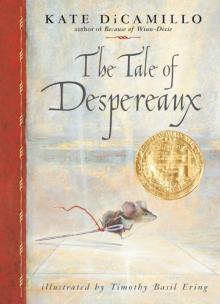 The Tale of Despereaux
The Tale of Despereaux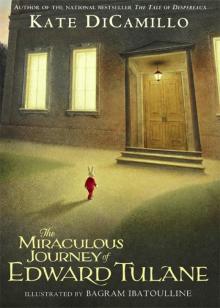 The Miraculous Journey of Edward Tulane
The Miraculous Journey of Edward Tulane The Magician's Elephant
The Magician's Elephant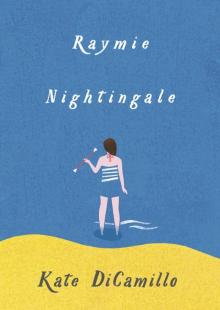 Raymie Nightingale
Raymie Nightingale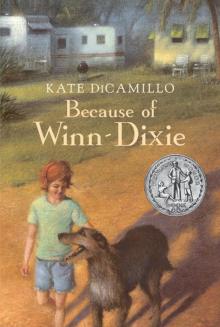 Because of Winn-Dixie
Because of Winn-Dixie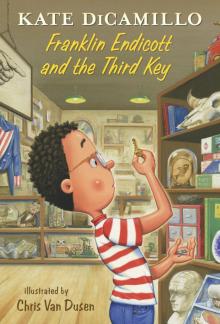 Franklin Endicott and the Third Key
Franklin Endicott and the Third Key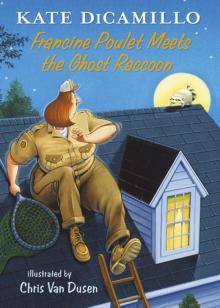 Francine Poulet Meets the Ghost Raccoon
Francine Poulet Meets the Ghost Raccoon Where Are You Going, Baby Lincoln?
Where Are You Going, Baby Lincoln? Flora & Ulysses: The Illuminated Adventures
Flora & Ulysses: The Illuminated Adventures Beverly, Right Here
Beverly, Right Here Eugenia Lincoln and the Unexpected Package
Eugenia Lincoln and the Unexpected Package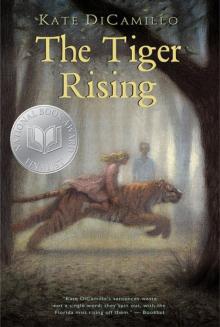 The Tiger Rising
The Tiger Rising The Beatryce Prophecy
The Beatryce Prophecy Leroy Ninker Saddles Up
Leroy Ninker Saddles Up